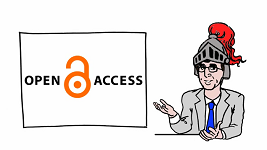- What is SOAR?
SOAR (Scholarly Open Access at Rutgers) is an institutional repository where Rutgers researchers can deposit their scholarly works and discover works authored by other Rutgers scholars. SOAR was developed in response to Rutgers University’s Open Access Policy for the purpose of providing and maintaining public access to Rutgers research and scholarship. Works deposited by authors are made available through the SOAR research portal and indexed by Google and other search engines where they can be discovered and read by researchers worldwide. SOAR is a service of the Rutgers University Libraries. For more information about SOAR, watch this brief introductory video:
- What is open access?
Open access is a model of scholarly publishing that makes research findings available to readers at no cost, as opposed to the traditional subscription model in which readers must pay for access via a subscription. The primary benefit of open access is that it enables the results of scholarly research to be disseminated more rapidly and widely thereby increasing its visibility and impact. For more information about open access, watch this brief introductory video:
- What is the Rutgers Open Access Policy?
The Rutgers Open Access Policy, effective September 1, 2015, stipulates that all Rutgers faculty, doctoral students, and post-doctoral researchers deposit a legal copy of each scholarly article produced while at Rutgers in the university repository at the time of its acceptance for publication. Learn more about Rutgers University’s Open Access Policy.
- What kinds of work are governed by this policy?
The policy applies to scholarship for which there is no expectation of payment, including peer-reviewed journal articles, conference proceedings, and working papers. However, researchers are welcome to deposit other types of scholarship in SOAR, including book chapters, reviews, presentations, technical reports, creative works, and patents.
- Does this policy mean that I have to publish in an open access journal?
No, you are free to publish in the journal of your choice. The policy only stipulates that authors deposit the final version of their work, commonly known as the postprint or accepted manuscript. The accepted manuscript is the author’s final draft after it has been peer reviewed and accepted for publication, but before it has been typeset and formatted by the publisher. Most publishers allow authors to deposit their accepted manuscript in an institutional repository. Some may require an embargo, or period of delayed access. If you have any questions about which version of your work to deposit, please contact us.
- Do I have to pay a fee to make my work open access?
No. Some publishers charge fees known as Article Processing Charges (APCs) to make your work open access in their journal. Paying these fees is not necessary to deposit your work in SOAR. Rutgers authors are free to publish in the journal of choice and deposit their accepted manuscript (final peer reviewed version) in SOAR at no charge. There is never a fee for deposit in SOAR, and open access via SOAR carries no charge to the author or reader.
- Can I opt out of the policy itself, or for a specific work?
The Rutgers Open Access Policy applies to works authored while employed by, or enrolled at, Rutgers accepted for publication after September 1, 2015. However, the policy affords authors the option of exempting specific works by submitting an Opt-Out Request Form via the SOAR website. Alternatively, scholars may choose to deposit their work in the repository and delay (embargo) access for a specified period of time. Even if the article cannot be made available immediately, the article’s metadata (citation and abstract) will be discoverable online. This allows maximum discoverability of all of Rutgers scholarship.
- What happens to my work when I leave the university?
Your deposited works will remain in SOAR where they will continue to be accessible to researchers all over the world. However, once you leave the university you will not be able to deposit new works in SOAR unless you are emeritus faculty.

